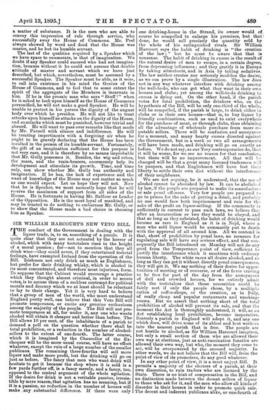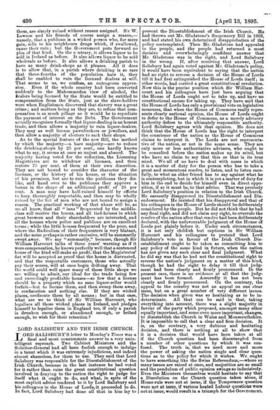SIR WILLIAM HARCOURT'S NEW VETO BILL. T HE conduct of the
Government in dealing with the liquor trade, is, to us, something of a puzzle. It is quite clear that they are not actuated by the horror of alcohol, which with many teetotalers rises to the height of a moral passion ; for—not to mention that they all drink wine—they could never, if they entertained teetotal feelings, have exempted Ireland from the operation of the Bill. Irishmen not only drink as much as Englishmen, but prefer for their drinking whisky, which is alcohol in its most concentrated, and therefore most injurious, form. To suppose that the Cabinet would encourage a practice which they thought almost criminal, in order to secure votes, is to accuse them of a reckless contempt for political morals and decency which we at least should be reluctant to lay to their charge. Yet it is very hard to believe that a group of men of the world, who must understand England pretty well, can believe that this Veto Bill will promote temperance, or excite any genuine enthusiasm among the majority of the people. The Bill will not pro- mote temperance at all, for under it, any one who wants alcohol will obtain it cheaper and better than before. The Bill allows 10 per cent, of the inhabitants of a parish to demand a poll on the question whether there shall be total prohibition, or a reduction in the number of alcohol- sellers to the extent of one-fourth. The latter course, which it is imagined by the Chancellor of the Ex- chequer will be the more usual course, will have no effect whatever, except the ruin of a large number of the smaller publicans. The remaining three-fourths will sell more liquor and make more profit, but the drinking will go on just as before. The fancy that men who want drink will hesitate to get it because the shop where it is sold is a few yards further off, is a fancy merely, and a fancy, too, opposed to the central argument of the whole agitation. If the desire for drink is not a veritable passion, irresis- tible by mere reason, that agitation has no meaning, but if it is a passion. no reduction in the number of houses will make ,any substantial difference. If there were only one drinking-house in the Strand, its owner would of course be compelled to enlarge his premises, but that done, he would sell precisely the quantity soldby the whole of his extinguished rivals. Sir William Harcourt says the habit of drinking is " the creation of the law ; " but he must be aware that that is nonsense. The habit of drinking in excess is the result of the natural desire of men to escape, in a certain degree, from depressing influences ; and they gratify it in Europe by taking stimulants, and in Asia by taking sedatives. The law neither creates nor seriously modifies the desire, as we can prove by a single illustration. The law does not in any way whatever interfere with drinking among the well-to-do, who can get what they want in their own houses and clubs ; yet among the well-to-do drinking in excess is dying out. On the other hand, if the parish votes for total prohibition, the drinkers who, on the hypothesis of the Bill, will be only one-third of the whole. will be compelled, if the parish is large, to drink either in clubs or in their own houses—that is, to buy liquor by friendly combinations, such as used to exist everywhere for the purchase of meat, or through dubs, thus obtaining all the advantage of wholesale purchase from more re- putable sellers. There will be confusion and annoyance for a moment, and many hearty curses directed against the Government, but in a week or two all arrangements will have been made, and drinking will go on exactly as before. We do not say, as our Tory contemporaries do, that it will be worse, for we see no reason for that conclusion, but there will be no improvement. All that will be changed will be that a great many licensed tradesmen will be paupers, and that Englishmen will have lost their liberty to settle their own diet without the interference of their neighbours. We are not arguing, be it understood, that the use of alcohol cannot be abolished by law. It can be abolished by law, if the people are prepared to make its manufacture or sale penal offences. Very few people are prepared to go to prison for the sake of getting a drink, and probably no one would face both imprisonment and ruin for tho sake of the profit on liquor-selling. If the community is sufficiently in earnest to pass such laws, we believe that after an insurrection or two they would be obeyed, and that so long as they subsisted, the habit of drinking would become as rare in England as it is in Nejd, where a man who sold liquor would be summarily put to death with the approval of all around him. All we contend is that, short of prohibition by penal laws, no measure for regulating sale will have any serious effect, and that con- sequently the Bill introduced on Monday will not do any good from the Temperance p oint of view, sufficient to justify the interference which it sanctions with ordinary human liberty. The white races all desire alcohol, and so long as they can get it without directly penal consequences, they will get it. We say nothing of their desire for oppor- tunities of meeting or of converse, or of the fierce craving to be free for part of the day from the annoyances of dull and crowded houses, for we entirely admit with the teetotalers that those necessities could be fairly met if only the people chose, by a multipli- cation of coffee-shops, or the creation, as in Italy, of really cheap and popular restaurants and smoking- rooms. But we assert that nothing short of the total prohibition of alcohol will prevent its sale, and that the moment the Act is thoroughly understood, it will, as an Act establishing local prohibition, become inoperative. Scarcely a parish in England will adopt it, and any one which does, will drive some of its ablest and best workers into the nearest parish that is free. The people are not hostile to alcohol, as Sir William Harcourt imagines, but only a small section of them who are allowed their own way at elections, just as anti-vaccination fanatics are allowed their own way, but who, the moment they come to act, will be overpowered by the aroused majority. In other words, we do not believe that the Bill will, from the point of view of its promoters, do any good whatever. In any other point of view, it is a most unjust Bill. It permits a majority of the electors of a parish, at their own discretion, to ruin traders who are licensed by the State. There is no hint of compensation in the Bill, and no distinction made between the decent sellers of liquor to those who ask for it, and the men who allow all kinds of disorder in their houses in order to promote quick sale. The decent and indecent publicans alike, or one-fourth of them, are simply ruined without reason assigned. Sir W. Lawson and his friends of course assign a reason,— namely, that a publican is a wicked person who, for mere gain, sells to his neighbours drugs which, if swallowed, cause their ruin ; but the Government puts forward no plea of that kind. On the contrary, it allows liquor to be sold in Ireland as before. It also allows liquor to be sold wholesale as before. It also allows a drinking parish to have as many drink-shops as it pleases. All it does is to allow that, in a parish where drinking is so rare that three-fourths of the population hate it, they shall be enabled to ruin the licensed dealers at will. That seems to us, we confess, an outrageous oppres- sion. Even if the whole country had been converted suddenly to the Mabommedan view of alcohol, the dealers being licensed by the State would be entitled to compensation from the State, just as the slave-holders were when Englishmen discovered that slavery was a great crime ; and matters being as they are, to refuse that com- pensation is as much pillage as it would be to repudiate the payment of interest on the Debt. The Government actually recognises formally that liquor-dealing is an honest trade, and then allows a majority to ruin liquor-dealers. They may as well license pawnbrokers or jewellers, and then allow a majority of electors to sack their shops.
As to the special feature of the new Bill, the method by which the majority—a bare majority—are to reduce the drinking-shops by 25 per cent., one hardly knows what to say, it seems at once so unjust and absurd. The majority having voted for the reduction, the Licensing Magistrates are to withdraw all licenses, and then restore 75 per cent. of them at their own discretion. They are not bound to consider the character of the licensee, or the history of his house, or the situation of his premises, but are to ruin the publicans they dis- like, and hand over to the publicans they approve a bonus in the shape of an additional profit of 25 per cent. A man may have half-ruined himself by efforts to keep thoroughly respectable, and then may be wholly ruined by the fiat of men who are not bound to assign a reason. The practical working of that ukase will be, as we all know, that all " inns " frequented by the middle- class will receive the bonus, and all tied-houses in which great brewers and their shareholders are interested, and all the houses where police and publican are on excellent terms ; while the little houses frequented by the poor, and where the Radicalism of their frequenters is very blatant, and the noise perhaps is rather excessive, will be summarily swept away. We say " summarily," because, though Sir William Harcourt talks of three years' warning as if it were compensation, he knows perfectly well that a sentenced house of the kind will make no profit, that the Magistrates' fiat will be accepted as proof that the house is distrusted, and that the respectable customers, those who actually pay their scores, will at once begin drifting away. That the world could well spare many of these little shops we are willing to admit, our ideal for the trade being few and exceedingly profitable houses—so few that a license should be a property which no sane liquor-seller would forfeit—but to license them, and then sweep them away, is confiscation and nothing else. If they are wicked places, confiscate them by all means ; but in that case, what are we to think of Sir William Harcourt, who legalises all those wicked places in Ireland, and pledges himself to legalise them in England too, if only a parish is drunken enough, or abandoned enough, or bribed enough, to wish for their retention ?



































 Previous page
Previous page